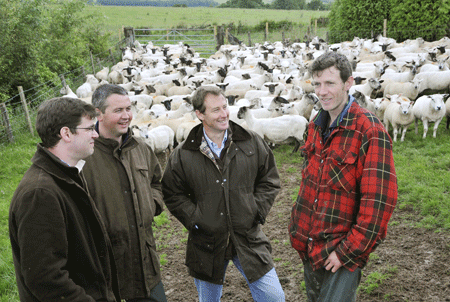FW Awards: Stuart Davies keeps a tight check on costs

- Stuart Davies
- Lower chapel, Brecon
For Stuart Davies in Lower Chapel, Brecon, sheep farming isn’t so much a business as his passion. Having spent many years as a contract shearer running a small flock in his spare time, Stuart has worked hard to get a foot on the farming ladder and is determined to make a success of his now flourishing enterprise.
The opportunity to take on the tenancy at Vale Farm was one too good to miss, remarks Stuart, but with it came a number of challenges, not least the trial of farming without a single farm payment or other subsidy payment.
“It has certainly focused my mind on making the business work financially as well as keep a tight check on costs.”
Stuart aims to be able to sell stock every month of the year to keep cash rolling through the business, so has arranged lambing into batches which both make it easier to lamb ewes with limited labour and ensure finished lambs are available for sale from April through to January. “We have 100 suckler cows and begin selling suckled calves from January onwards.”
And, while some farmers may prefer to take lambs to heavier weights Stuart prefers to market early season lambs slighty lighter to gain the best return. “Selling 34-35kg lambs might not suit everyone, but when selling them earlier in the season they made up to £70 a head and they wouldn’t have made that later, despite being heavier. And I don’t have the costs of taking them to the heavier weight.”
On the breeding side of things Stuart is keen to make his mark and runs a flock of pedigree Suffolks alongside his 1800 commercial ewes which are largely Welsh Mountain and crossbreds. “The Suffolks aren’t the mainstay of the business, but provide an interest for me away from the commercial flock.”
With limited cash to call on he has made the strategic decision to buy older Welsh Mountain and crossbred ewes capable of breeding for another two or three seasons rather than buying shearlings. “These ewes don’t cost so much, have lambed before so should be good mothers and crucially, the cull price we receive for them after two or three years is close to the price we pay for them originally, so depreciation is dramatically reduced.”

Admittedly this could compromise the health status of the flock and buying in sheep always risks buying in disease, explains Stuart. “But all bought-in ewes are treated for scab and worms and isolated before being mixed with the main flock at lambing.”
And with health an increasing concern, he is also keen to make use of advancing technologies and breeding techniques to reduce problems. “Regular drenching isn’t something we can justify anymore, so faecal egg counting will be used to target treatments at stock needing it. A hard culling strategy is being implemented and sheep which are repeatedly lame or have lambs which need suckling aren’t being retained.”
Grassland management has also come to the fore of Stuart’s mind as feed prices have escalated. So the aim is to have grass ready for ewes and lambs to be turned out on to by using root crops for outwintering and housing ewes before lambing. “Feed use has halved this winter and it should be cut further next year. Grass is regularly topped to maintain quality and clover is being increased in swards to boost productivity and cut fertiliser use.”
And with industry increasingly short of visionaries and leaders, Stuart is already stepping up to the challenge here, too. As chairman of Wales and Borders region of the Suffolk Sheep Society Stuart has definite views on the way the breed needs to move and is now in a position to influence the direction it takes.
Alongside this Stuart is heavily involved in Young Farmers and often gives up his time to help members understand the finer points of stock judging through training events. The farm also hosts a number of shearing training courses, something Stuart has benefitted from himself in the past and is keen for others to succeed at. As a member of a local discussion group Stuart is regularly playing host to farm visits and attends meetings with the aim of always bringing back at least one idea he could try at home.
What the judges liked
- Ability to spot opportunities
- Clear vision of future strategy
- Understands clientsÕ needs
- Farming on a large scale with minimal labour inputs
- Willing to take professional advice
Farm facts
- 283ha (700 acre) grassland and crop farm
- 1800 ewes and 100 sucklers, including pedigree Suffolk and Tallybont Welsh Mountain flocks
